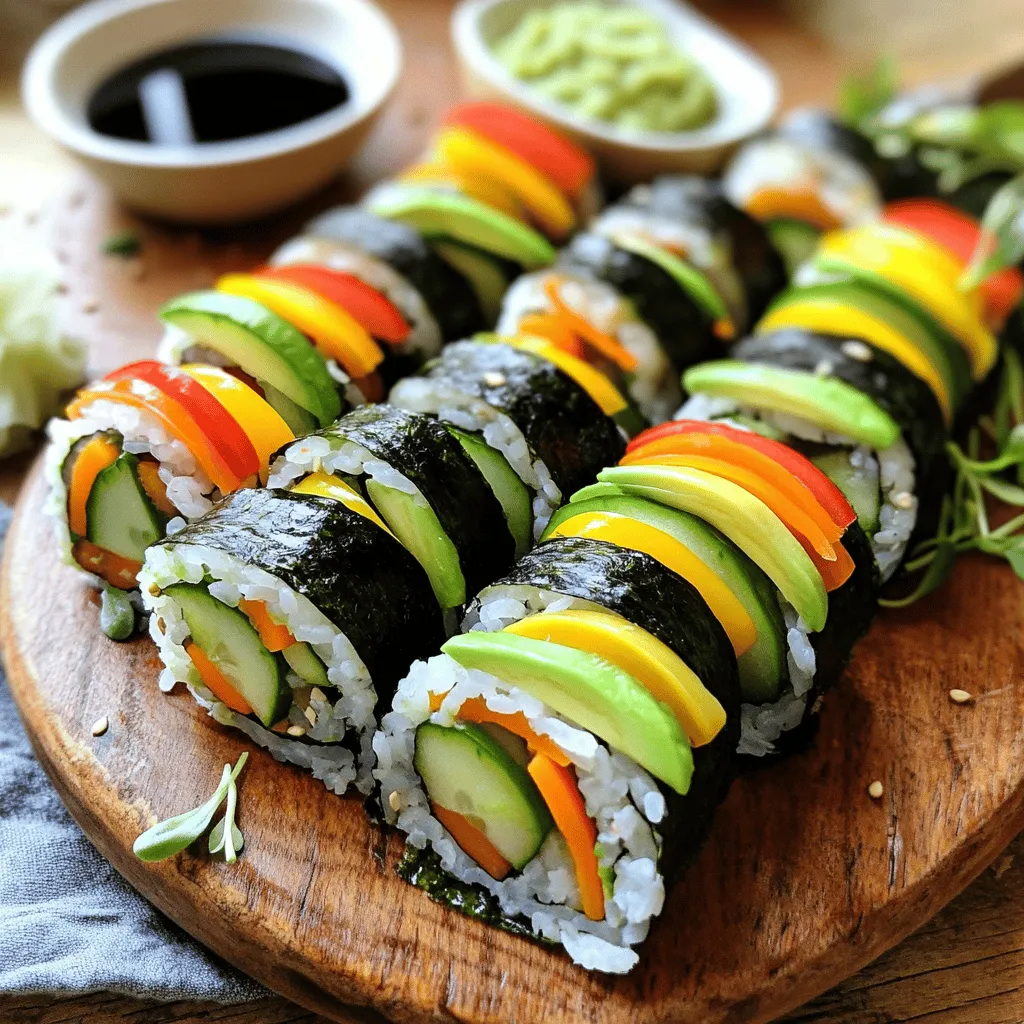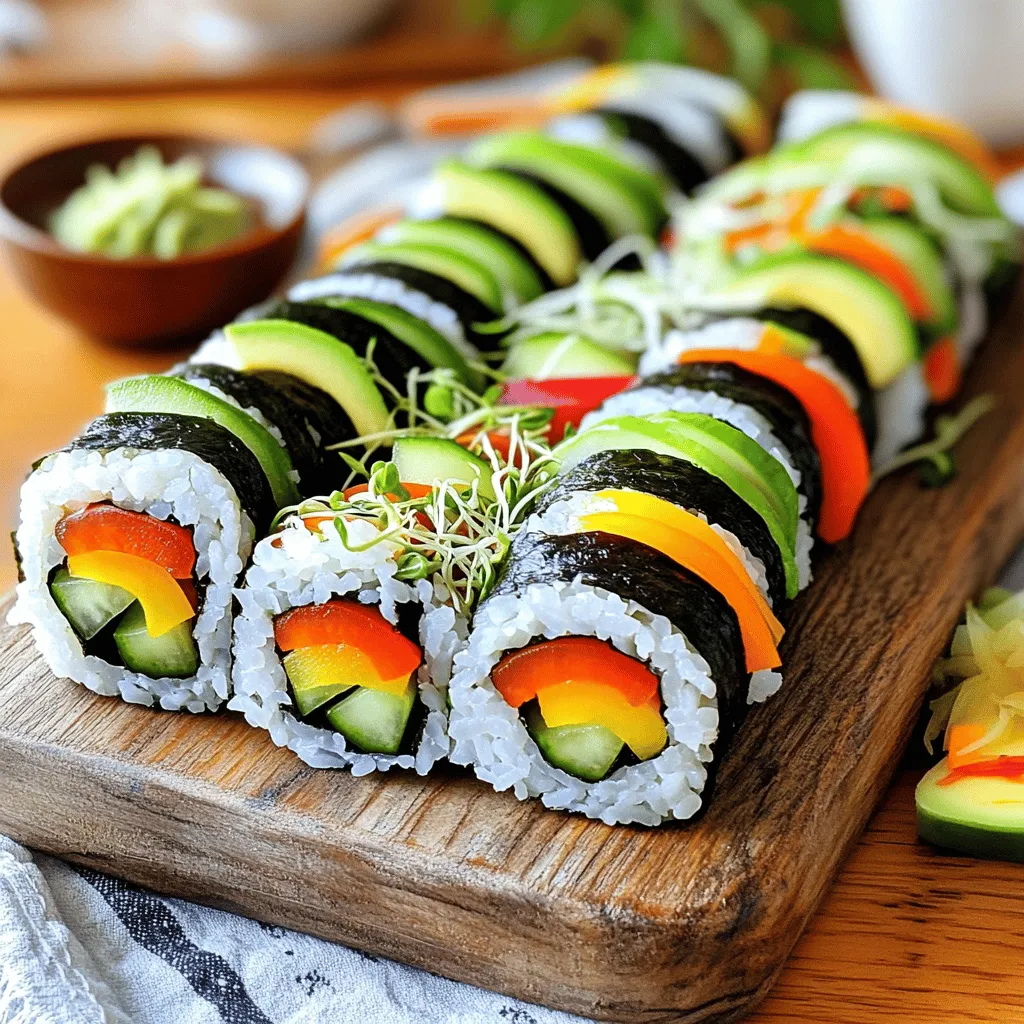Get ready to roll with a burst of colors and flavors! Rainbow Veggie Sushi Rolls are not only fun to make, but they are also packed with fresh veggies. In this guide, I’ll show you how to create these vibrant rolls step-by-step. Whether you’re a sushi pro or a beginner, you’ll impress your friends and family with this healthy treat. Let’s dive into the world of colorful sushi!
Ingredients
Main Ingredients
– 1 cup sushi rice
– 1 1/4 cups water
– 4 sheets of nori (seaweed)
– 1/2 cucumber, julienned
– 1 small carrot, julienned
– 1/2 bell pepper (any color), sliced into thin strips
– 1 avocado, sliced
– 1/4 cup sprouts (like alfalfa or radish)
Seasoning Ingredients
– 2 tablespoons rice vinegar
– 1 tablespoon sugar
– 1 teaspoon salt
Optional Accompaniments
– Soy sauce, for dipping
– Pickled ginger (optional)
– Wasabi (optional)
Gathering these fresh ingredients makes this dish vibrant and fun. The sushi rice is key for a perfect roll. It holds everything together. The nori adds a lovely taste of the sea. Using colorful veggies like cucumber, carrots, and bell peppers makes each bite a delight. The avocado brings creaminess, while sprouts add a nice crunch.
For seasoning, rice vinegar gives a tangy touch. Sugar and salt balance the flavor well. These elements work together to create a delicious sushi experience.
You can enjoy these sushi rolls with soy sauce, pickled ginger, or wasabi if you like a kick. This recipe not only looks pretty but also tastes amazing!
Step-by-Step Instructions
Preparing the Sushi Rice
Rinsing the rice
First, rinse the sushi rice under cold water. Use a fine-mesh strainer for best results. Keep rinsing until the water runs clear. This step removes excess starch and helps the rice cook evenly.
Cooking the rice
In a medium saucepan, combine the rinsed rice and water. Use 1 1/4 cups of water for every cup of rice. Bring the mixture to a boil over high heat. Once boiling, reduce the heat to low. Cover the pot and let it simmer for 15 minutes. After that, remove it from heat and let it sit for another 10 minutes. Keep the pot covered during this time to trap steam.
Seasoning the Rice
Mixing vinegar, sugar, and salt
While the rice cooks, prepare the seasoning. In a small bowl, mix rice vinegar, sugar, and salt. Stir until the sugar dissolves completely. This mixture gives the rice a nice flavor.
Cooling the rice
After the rice has rested, fluff it with a fork. Slowly mix in the vinegar mixture. This step adds taste and helps the rice stick together. Let the rice cool to room temperature before rolling.
Assembling and Rolling the Sushi
Using a sushi mat
Lay a bamboo sushi mat on a clean surface. Cover it with plastic wrap to keep it clean. This mat helps you roll the sushi perfectly.
Layering the ingredients
Place a sheet of nori, shiny side down, on the mat. Wet your hands to prevent sticking. Grab a handful of sushi rice and spread it evenly over 2/3 of the nori. Leave a small border at the top. Then, layer cucumber, carrot, bell pepper, avocado, and sprouts across the rice.
Proper rolling technique
Start rolling the sushi away from you. Use the mat to guide your roll. Roll tightly but don’t squeeze too hard. Moisten the top edge of the nori to seal the roll. This keeps the filling inside.
Tips & Tricks
Perfecting the Sushi Rice
To make great sushi, you need to start with the rice. Rinse the sushi rice well under cold water. This step removes excess starch and prevents it from being too sticky. Cook the rinsed rice in a pot with the right amount of water. Bring it to a boil, then lower the heat and cover it. Let it simmer until all the water is absorbed.
After cooking, let the rice sit for ten more minutes. This resting time helps the rice become fluffy. Once rested, mix rice vinegar, sugar, and salt in a bowl until they dissolve. Gently fold this mixture into the rice. Allow the rice to cool to room temperature before using it.
Vegetable Selection
Choosing the right veggies is key to colorful sushi. You want a mix of colors and textures. Great options include:
– Cucumber
– Carrots
– Bell peppers
– Avocado
– Sprouts
For a fresh twist, use seasonal vegetables. In summer, add zucchini or radishes. In fall, try roasted sweet potatoes or beets. These choices add unique flavors and colors.
Presentation Ideas
How you serve your sushi matters. Arrange the rolls on a large platter for a vibrant display. Cut each roll into 6-8 pieces for easy serving. To garnish, use sesame seeds or fresh herbs. You can also add small bowls of soy sauce and pickled ginger on the side. This makes for a lovely and inviting meal.

Variations
Different Vegetable Combinations
You can mix and match veggies in your sushi rolls. Try using bright purple cabbage for a pop of color. Add some yellow squash for a sunny twist. You can also slice up radishes for a crunchy bite. For extra flavor, consider adding proteins like tofu or shrimp. They add a nice heartiness to your rolls.
Vegan and Gluten-Free Options
If you’re vegan, skip the shrimp and use more veggies instead. You can use avocado or even marinated tempeh for protein. If you need gluten-free options, use gluten-free soy sauce. This will keep your sushi tasty and safe for everyone. Always check labels to avoid hidden gluten in sauces.
Innovative Sushi Styles
Want to change things up? Try the sushi burrito style. Simply roll your ingredients in a larger sheet of nori. This makes a fun, handheld meal. You can also create sushi salads. Just chop all your ingredients and serve them in a bowl. It’s a fresh take on sushi without the rolling.
Storage Info
Refrigeration Recommendations
To store leftover sushi rolls, place them in an airtight container. This helps keep the rolls fresh. You can also wrap them in plastic wrap. This keeps moisture in and prevents drying out. Sushi rolls stay good for about 1-2 days in the fridge. After that, the rice may harden and the veggies lose crunch.
Reheating Guidelines
Can sushi be reheated? It’s best to eat sushi cold, but you can warm it up. For safe methods, try using a microwave on low power. Heat for about 10-15 seconds at a time. Check often to avoid overheating. If you want to reheat sushi rice, steam it lightly. This keeps the rice fluffy and soft. Enjoy your rainbow veggie sushi with fresh flavors!
FAQs
How to prevent sushi rice from sticking?
To stop sushi rice from sticking, wet your hands. This keeps the rice from clumping. You can also add a little vinegar to the water you rinse the rice in. This helps the rice stay loose when you roll it.
Can I use brown rice instead of sushi rice?
Yes, you can use brown rice. However, it will have a different taste and texture. Brown rice takes longer to cook, so adjust your cooking time. Also, it may not stick together as well as sushi rice.
What other vegetables can I use in rainbow sushi rolls?
You can use many veggies! Try sweet potato, zucchini, or radishes for crunch. Bell peppers and greens like spinach or kale also work well. Feel free to mix and match for more color.
How do I make sushi rolls without a bamboo mat?
You can roll sushi by hand. Use a clean kitchen towel instead of a mat. Lay the nori on a flat surface, add your rice and veggies, and roll tightly. Just be careful to keep the roll tight.
Is homemade sushi safe to eat?
Yes, homemade sushi is safe if you use fresh ingredients. Keep your kitchen clean and wash your hands. Use sushi-grade fish if you add seafood. Always store your sushi properly to keep it fresh.
You learned how to make sushi from scratch. We covered the main ingredients, seasoning, and optional sides. You saw step-by-step instructions for preparing the rice and assembling your rolls. I shared tips for perfect sushi, creative variations, and storage advice.
Making sushi at home is rewarding and fun. Experiment with flavors and styles to find your favorite. Enjoy sharing your sushi creations with family and friends. Happy rolling!




